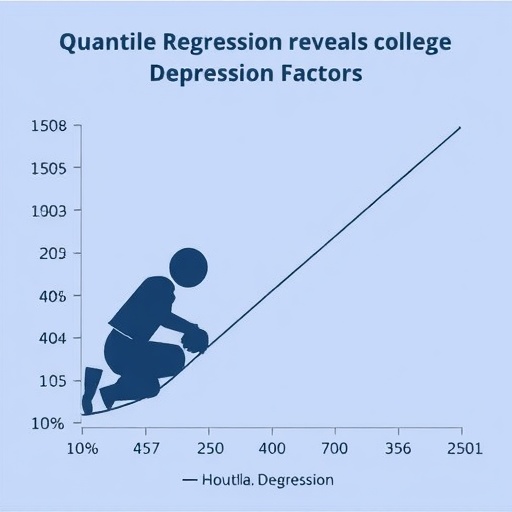In a groundbreaking study published in BMC Psychiatry, researchers have unveiled nuanced factors influencing depressive disorders among college students. Leveraging the power of quantile regression analysis, the study sheds new light on the intricate relationships between psychological variables and depressive symptoms, offering deeper insights than traditional linear modeling approaches.
Depressive disorders represent a growing concern within the college demographic, manifesting complexities that evade simplistic analyses. Previous research often relied on linear regression models, which assume uniform effects across populations. However, this approach glosses over crucial heterogeneities in how depressive symptoms manifest and interact with psychosocial factors among students at different severity levels.
The recent study, conducted across six universities in China, methodically surveyed over 3,000 students, yielding 2,580 valid responses. Researchers utilized an array of psychometric instruments, including the Patient Health Questionnaire-9 (PHQ-9), known for its sensitivity in screening depressive symptoms, and the Interpersonal Sensitivity subscale of the Symptom Checklist-90, to quantitatively capture psychological distress. Complementing these measures, the Positive Psychological Capital Questionnaire and Perceived Social Support Scale assessed resilience and social connectivity dimensions, respectively.
What sets this investigation apart is its application of quantile regression — a statistical technique that estimates relationships at various points in the outcome distribution rather than focusing solely on average effects. This approach enables the dissection of factors affecting students with mild versus severe depressive symptoms, uncovering patterns obscured in conventional analyses.
Findings reveal a striking 22.4% prevalence of depressive disorders within the sampled population, underscoring the urgency for tailored mental health interventions in collegiate settings. Notably, social support and psychological capital — encompassing hope, efficacy, resilience, and optimism — exhibited robust negative associations with depressive symptom severity across multiple quantiles. This suggests that students with stronger social networks and psychological resources experience fewer depressive symptoms, with these protective effects becoming more pronounced in students with more severe depression.
Conversely, interpersonal sensitivity, which reflects an individual’s propensity to perceive and react to social cues negatively, was positively correlated with depressive symptom intensity. This factor’s influence amplified at higher quantiles, indicating that students experiencing more severe depression tend to exhibit heightened interpersonal sensitivity, potentially exacerbating their symptoms.
An interesting nuance identified was the role of regular contact with family, which held a statistically significant negative association with depressive severity but mainly in lower quantiles. This points to the complex ways in which familial support interplays with mental health, possibly offering early buffering effects that diminish as depression progresses.
The heterogeneity unveiled by quantile regression accentuates the need for stratified mental health strategies. While enhancing social support and psychological capital might broadly benefit students, those grappling with severe depression may require interventions specifically targeting interpersonal sensitivity, such as cognitive-behavioral techniques to reframe maladaptive social perceptions.
Methodologically, employing SPSS 26.0 software for quantile regression represents an advanced analytic approach, emphasizing the increasing accessibility of sophisticated statistical tools in psychological research. By moving beyond means-based inference, the study pioneers a more granular exploration of mental health epidemiology.
Importantly, the research’s cross-sectional design captures a snapshot of depressive disorders during a defined period in late 2022, providing timely insights amidst a global landscape where young adults face mounting psychosocial pressures. However, the temporal limits highlight avenues for longitudinal studies to track how these associations evolve and respond to interventions.
This comprehensive investigation propels forward the understanding of depression’s multifaceted nature in young adults, particularly within academic environments. Its findings advocate for dynamic, personalized mental health programs that consider the varying severity and underlying psychosocial mechanisms among college students.
Future research might build upon these insights by integrating biological markers or neuroimaging data, merging psychological and physiological dimensions to construct even richer predictive models of depression trajectories. Moreover, expanding cross-cultural validations could enhance the generalizability of these associations globally.
In conclusion, this study exemplifies how cutting-edge statistical methodologies can unravel the complexity underlying mental health conditions. The implication for universities and health policymakers is clear: addressing depression requires nuanced, data-driven strategies attuned to diverse student experiences, with an emphasis on bolstering protective factors while mitigating vulnerabilities such as interpersonal sensitivity.
This paradigm shift in mental health research not only advances academic knowledge but also holds tangible promise for enhancing student wellbeing, reducing depressive burden, and fostering resilient collegiate communities worldwide.
Subject of Research: Depressive disorders and associated psychosocial factors in college students analyzed through quantile regression.
Article Title: Factors associated with depressive disorders in college students using quantile regression analysis.
Article References:
Xu, H., Zhang, C., Wang, Z. et al. Factors associated with depressive disorders in college students using quantile regression analysis. BMC Psychiatry 25, 868 (2025). https://doi.org/10.1186/s12888-025-07334-w
Image Credits: AI Generated




